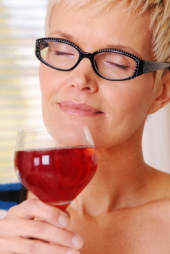

Wine Tasting - An Adventure of the Senses!Wine tasting is a whole world in and of itself. I personally have trouble tasting all of the flavors in the dinner I just cooked... And I added all of the ingredients! Mom... is there garlic in this? Hmmm... I think I added some... why? does it taste too garlicky? No... I just thought it tasted like there was garlic... hmmm... then I must have added some. If you are like me and are curious about wine tasting then come along on my home wine tasting adventure! The thing about wine tasting is that the taster takes into account all of their senses... taste... smell... visual... overall feel... I do those things naturally but I guess not to the extent that the "professional" wine taster does. By the way... how does someone get to be a "professional" wine taster?!? I have never seen that job posted... I would have applied if I had... Have you watched one of these shows? But giving wine tasting a try yourself can actually be pretty fun... this is the wine tasting process...
The Look: Check out the Color and Clarity. Pour your wine into the proper wine glass... and take a good look. Hold the glass away from you and see how the color varies from top to bottom. Use surrounding light to help you see the variances.
Pour your wine into the proper wine glass... and take a good look. Hold the glass away from you and see how the color varies from top to bottom. Use surrounding light to help you see the variances. Try to determine what color it is... and I don't mean just red or white... think about the type of red... Really think about it and try to determine all of the nuances... Write down all of your observations. Okay... still looking at your wine what is its opacity? Is there sediment at the bottom of your glass? Swirl your wine a bit... make note of anything that may be floating in your glass... make note of the effect of the colors in the glass... is it a bright wine? Or is it perhaps dull? Write down your observations...
The Smell: What is the aroma?This is a very important component when analyzing a glass of wine. What you will do is to again swirl your glass... not too much or you will spill it on yourself... speaking from experience here...Now... take a quick smell... what is your first impression of the wine? Stick your nose down further into the glass and breathe deeper. Now what do you think? Close your eyes and think about each varied smell... do you smell flowers? Oak? Vanilla? Swirl the glass again to mix the aromas again... do you smell anything different? Jot down each impression you have... You might be surprised at some of the things wine makers put into their wines to make them unique so don't be afraid to write down an impression just because you think it is odd...
The Taste: Three StagesOkay... the most important step in my book... take a taste.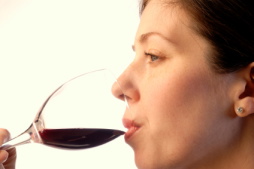 Just a small sip and let it roll around on your tongue. Think about your first impression. This is called the Attack stage., the Evolution phase and the Finish. Just a small sip and let it roll around on your tongue. Think about your first impression. This is called the Attack stage., the Evolution phase and the Finish. The Attack Stage, is the initial impression that the wine makes on your taste. During this stage you will think about the alcohol content, tannin levels, acidity and residual sugar. Optimally these four components will be balanced and one part will not over power the others. These impressions are not part of the actual flavor of the wine but they do affect how the flavors are received. They are what gives the wine a feeling of softness... butteriness... lightness or heaviness. Don't forget to jot down your impressions at this stage. The next stage is The Evolution Stage... also called the mid-palate or middle range phase. This is the actual "taste" of the wine. Is it fruity? Is it smoky? Can you taste herbs? Cinnamon? What are the actual flavors of the wine? Take your time here and try to taste each flavor and identify it. I wonder what the equinox moon and Mediterranean sea spray tastes like? The Finish - The Final StageThe Final stage is of course called The Finish. This is where you evaluate the aftertaste of the wine...what does it taste like after you swallow it? How long does the taste stay with you? Can you still taste the wine when you breathe? Do you feel like you want another sip? Or did the wine leave a bitter taste in your mouth? Don't forget to write down your thoughts as you are thinking them... Now that you have gone through all of the wine tasting steps write down your overall impression of the wine. Did you like it? Was it too sweet? What could you see yourself eating with this wine? Is it a dessert wine or a cheese wine? And don't forget to write down all of the specifics of the wine so you will remember who made it... the year... the name of the wine etc. It is such fun to compare wine tasting notes with others to see who came closest to the ingredients of the wine... who felt the same as you did... who could taste the equinox...
Return to Top of Wine Tasting
Wine Ratings - What does it all mean?!? - Wine ratings... what do they mean? Should I rate my home made wine?!?
|




















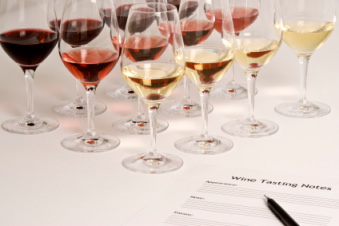 I have watched professional wine tasters on TV and I am always amazed that they can pick out the teeniest tiniest of flavors from a single sip...
I have watched professional wine tasters on TV and I am always amazed that they can pick out the teeniest tiniest of flavors from a single sip... 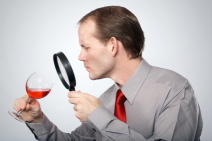 The taster will say something like "I feel that this wine was birthed during a lunar equinox... there are hints of a sea spray that can only be found off the coast of the Mediterranean Sea... " I am just always amazed at how they know these things...
The taster will say something like "I feel that this wine was birthed during a lunar equinox... there are hints of a sea spray that can only be found off the coast of the Mediterranean Sea... " I am just always amazed at how they know these things... 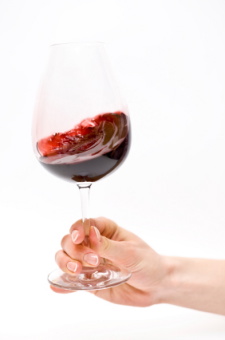 such as maroon or brick red... or if it appears yellowish or golden... maybe amber... is it a deep color? Is it a light color?
such as maroon or brick red... or if it appears yellowish or golden... maybe amber... is it a deep color? Is it a light color? 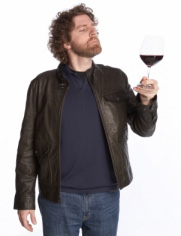 Is your wine watery and clear? Is it Dark and heavy? Is it opaque and cloudy?
Is your wine watery and clear? Is it Dark and heavy? Is it opaque and cloudy? 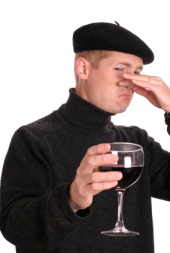 Does it smell good? Smell bad?
Does it smell good? Smell bad?